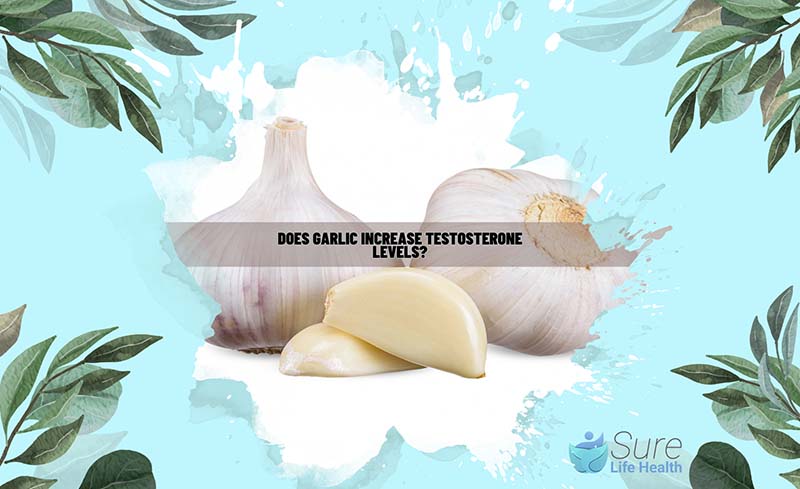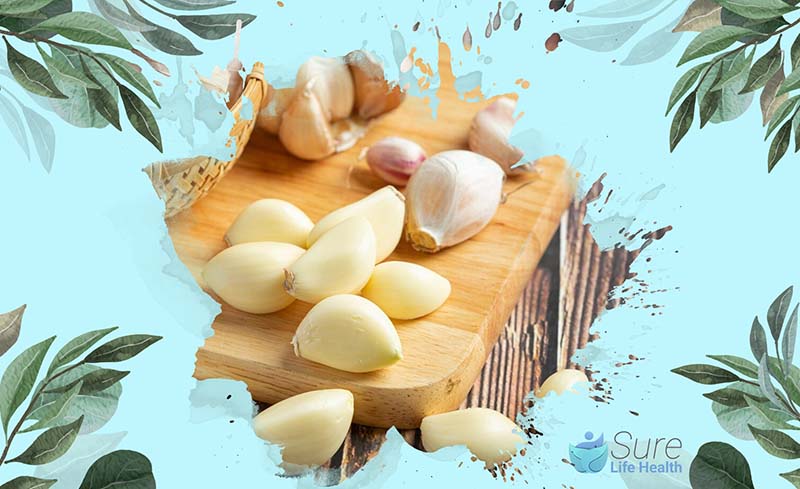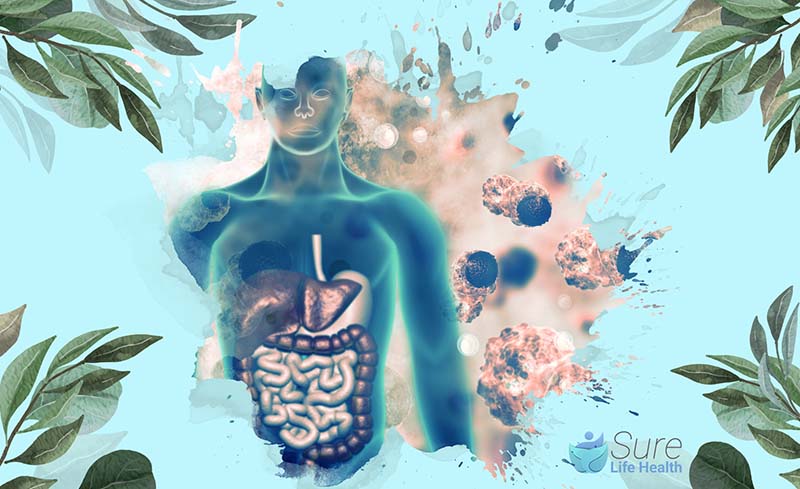Exploring the question “Is Garlic Good for Testosterone?” reveals garlic’s potential in boosting testosterone levels. Known for its flavor and health benefits, garlic contains components like allicin that may enhance testosterone production.
It supports hormonal balance, heart health, and blood flow. However, optimal hormonal health also depends on a holistic approach including exercise, sleep, and stress management. Garlic, while beneficial, underscores the importance of a balanced lifestyle for overall well-being.
Is Garlic Good for Testosterone?
Garlic contains bioactive compounds such as allicin, alliin, ajoene, and others, believed to enhance testosterone production. Research indicates that garlic can have a significant impact on testosterone levels:
- Study 1 (2001): A clinical intervention involving male rats found that garlic supplementation led to a notable increase in testicular testosterone levels. Additionally, the sulfur compound diallyl disulfide, found in garlic, was observed to enhance the production of luteinizing hormone (LH), a key hormone involved in testosterone production.
- Study 2 (2015): Another study demonstrated that consuming garlic cloves promoted the regeneration of Leydig cells in the testicles. Leydig cells play a crucial role in testosterone production.
- Study 3 (2021): Recent research has reaffirmed the testosterone-boosting potential of garlic. Specifically, it highlighted the role of S-allyl cysteine, a bioactive compound present in garlic, in elevating testosterone levels.
Moreover, garlic’s antioxidative properties are believed to support testicular function and overall male reproductive health. While consuming garlic raw is recommended for maximum benefits, it can also be taken as a supplement to achieve similar effects.
Adding garlic to your diet, combined with exercise and balanced eating, offers a strategic approach to fighting testosterone deficiency. However, it’s essential to consult with a healthcare professional before starting any new supplement regimen, especially if you have existing health conditions or concerns.

Garlic and Testosterone: What’s the Connection?
Multiple studies have explored the relationship between garlic consumption and testosterone levels, highlighting a direct correlation between the two. Garlic has been shown to have a substantial impact on testosterone levels, attributed to its potent constituents.
Garlic is rich in various vitamins and minerals, including potassium, zinc, calcium, magnesium, and B-complex vitamins. Additionally, it contains a plethora of bioactive compounds such as allicin, alliin, ajoene, S-allyl-cysteine, diallyl sulfide, and other allyl derivatives. These compounds work synergistically to address the underlying causes of testosterone deficiency, thereby increasing and maintaining testosterone levels.
One of the most significant studies in this field is a clinical intervention conducted in 2001, which comprised two phases:
- Phase One: This phase assessed the impact of garlic supplementation on testicular testosterone levels in animal subjects. After nearly a month of garlic supplementation, researchers observed a substantial increase in testicular testosterone levels in male rats.
- Phase Two: This phase focused on studying the effects of garlic’s sulfur compound, diallyl disulfide. The results indicated that administration of diallyl disulfide significantly elevated the luteinizing hormone (LH) levels in the pituitary gland. LH plays a crucial role in regulating testosterone levels. Additionally, the research concluded that garlic stimulates protein biosynthesis by boosting testosterone levels.
Furthermore, a study from 2015 demonstrated that consuming garlic cloves could promote Leydig cell regeneration in the testicles, thereby supporting healthy testosterone production.
Digging deeper into the available data, a recent study from 2021 investigated the effects of S-allyl cysteine, one of the bioactive compounds found in garlic. The findings of this study confirmed that an increased intake of S-allyl cysteine led to a significant rise in testosterone levels.

How to Eat Garlic to Boost Testosterone Effectively
If you’re looking to harness the testosterone-boosting benefits of garlic, incorporating it into your diet is straightforward. Here’s how to do it effectively:
- Include Garlic in Your Meals: Simply adding 2–3 cloves of garlic to your daily dietary intake can provide you with the necessary nutrients to support testosterone production. Consuming garlic raw is recommended to preserve its valuable components. Avoid excessive heating or cooking, as this may alter the chemical composition of garlic and diminish its effectiveness.
- Raw Consumption: To get the most out of garlic, consider consuming it raw. You can mince or crush garlic cloves and add them to salads, dressings, or sauces for a flavorful boost without overwhelming your taste buds.
- Supplementation: If you’re not fond of the taste of raw garlic, you can opt for garlic supplements. Follow the manufacturer’s recommendations for dosage and administration, as each product may have specific guidelines. Look for supplements manufactured by reputable brands in FDA and GMP-certified facilities. Additionally, ensure that the product undergoes testing by a third-party laboratory to guarantee quality and potency.
Other Health Benefits of Consuming Garlic
In addition to its role in boosting testosterone levels, garlic offers a range of other health benefits that can positively impact overall well-being. Here are some key advantages of consuming garlic:
Garlic Causes a Reduction in Cholesterol Levels
Garlic is known to help maintain healthy cholesterol levels by reducing the levels of LDL (low-density lipoprotein), often referred to as “bad” cholesterol, in the body.
Studies have shown that incorporating garlic into your diet can lower cholesterol by as much as 10%, without adversely affecting HDL (high-density lipoprotein) cholesterol levels.
Garlic Helps Eliminate Toxins
Garlic aids in detoxification by stimulating the production of glutathione, an antioxidant produced by its sulfur-rich components. Glutathione activates liver enzymes, facilitating the removal of toxins from the body.
Regular consumption of garlic can assist in flushing out harmful substances accumulated from food, air pollutants, and other sources, thereby supporting overall health and potentially preventing hormonal imbalances.

Garlic Helps Regulate Blood Pressure
Regular garlic intake is linked to lower blood pressure and cholesterol, promoting heart health and indirectly boosting testosterone.
Garlic can be consumed raw or in supplement form for those who are sensitive to its strong odor.
Garlic Improves Muscle Function and Endurance
Garlic enhances the effects of amino acid-rich foods in the body, optimizing muscle growth and function.
This improvement in muscle function leads to better athletic performance, allowing individuals to engage in high-intensity workouts more efficiently.
Enhanced muscle function and endurance are crucial for those seeking to boost testosterone levels through exercise.

Garlic Helps Prevent Oxidation
Garlic contains allyl derivatives such as allyl cysteine and allyl disulfide, which act as powerful antioxidants.
These compounds help minimize the effects of free radicals in the body, reducing oxidative damage at the cellular level.
By aiding in post-workout muscle recovery and reducing physical fatigue, garlic supports increased physical endurance, facilitating more intense training sessions and potential testosterone enhancement.
Garlic Helps Improve the Immune System
Regular consumption of garlic can enhance immune function due to its anti-inflammatory and immunomodulatory effects. Garlic’s ability to improve immunity makes it a valuable natural remedy for fighting against various ailments, including cardiovascular issues, microbial infections, and malignant tumors.
Incorporating garlic into your daily diet can provide a multitude of health benefits beyond just testosterone support. Whether consumed raw, cooked, or in supplement form, garlic’s versatile nature makes it a valuable addition to any wellness routine. However, it’s important to consult with a healthcare professional before making significant dietary changes or starting any new supplements, especially if you have existing health conditions or concerns.
Conclusion
So “is garlic good for testosterone?” Yes, garlic is beneficial for health and particularly for boosting testosterone levels, but it achieves optimal effectiveness as part of a broader wellness strategy.
Consuming garlic raw is recommended to maximize its benefits, which include improved circulation and libido, thereby contributing to overall vitality and sexual health. For individuals seeking an extra testosterone boost, combining garlic with regular exercise, a nutritious diet, and possibly specialized supplements containing garlic extract can further enhance hormonal balance and well-being. However, it’s crucial to consult with a healthcare professional before starting any new supplement regimen to ensure it’s safe and effective for your specific health needs.
Be sure to explore more insightful blogs from Sure Life Health, where we continue to shed light on the latest trends and breakthroughs in health and wellness.
Professor Gaye Cunnane, PhD, MB, FRCPI
As the Director of Health and Wellbeing at RCPI, Professor Gaye Cunnane is at the helm of initiatives aimed at enhancing the health and well-being of RCPI Trainers and Trainees. Her role extends beyond administration; she is also a respected clinical professor of rheumatology and a consultant rheumatologist at Trinity College Dublin (TCD) and St James’s Hospital. Prof. Cunnane’s medical journey began at TCD, where she graduated from medical school, and her path has been marked by both clinical and academic excellence.
After completing her basic clinical training in medicine, she embarked on PhD studies at University College Dublin and St Vincent’s University Hospital. Her research during this period was focused on prognostic markers in early inflammatory arthritis, a project that saw her collaborating with esteemed universities across Europe, including in Switzerland, The Netherlands, the UK, and Sweden.
Prof. Cunnane’s career took her to the University of California, San Francisco, where she spent three years delving into research on new treatments for lupus. Her academic prowess led her to the University of Leeds in 2001 as a senior lecturer, before returning to Ireland in 2003 to assume her current roles. She has also served as the National Specialty Director for Rheumatology training in Ireland, Programme Director for Basic Specialist Training with RCPI, and as a past President of the Irish Society for Rheumatology.
PUBLISHED ARTICLES
“Rheumatic disease differentiation using immunoglobulin G sugar printing by high-density electrophoresis”: Published in The Journal of Rheumatology, this study reflects her in-depth investigation into rheumatic diseases.
“Benefits of exercise in patients with rheumatoid arthritis: a randomized controlled trial”: This research work, highlighting the positive impact of exercise on rheumatoid arthritis, underscores Prof. Cunnane’s dedication to practical, patient-centered research.
Additionally, Prof. Cunnane has made notable contributions to the Annals of the Rheumatic Diseases, discussing early referral, diagnosis, and treatment of rheumatoid arthritis. She has also been involved in a study on the NCBI platform investigating exercise benefits in rheumatoid arthritis patients.
Professor Gaye Cunnane’s career is a testament to her commitment to improving patient outcomes in rheumatology through rigorous research, clinical excellence, and dedicated teaching. Her work continues to influence the field of rheumatology, both in Ireland and internationally.

